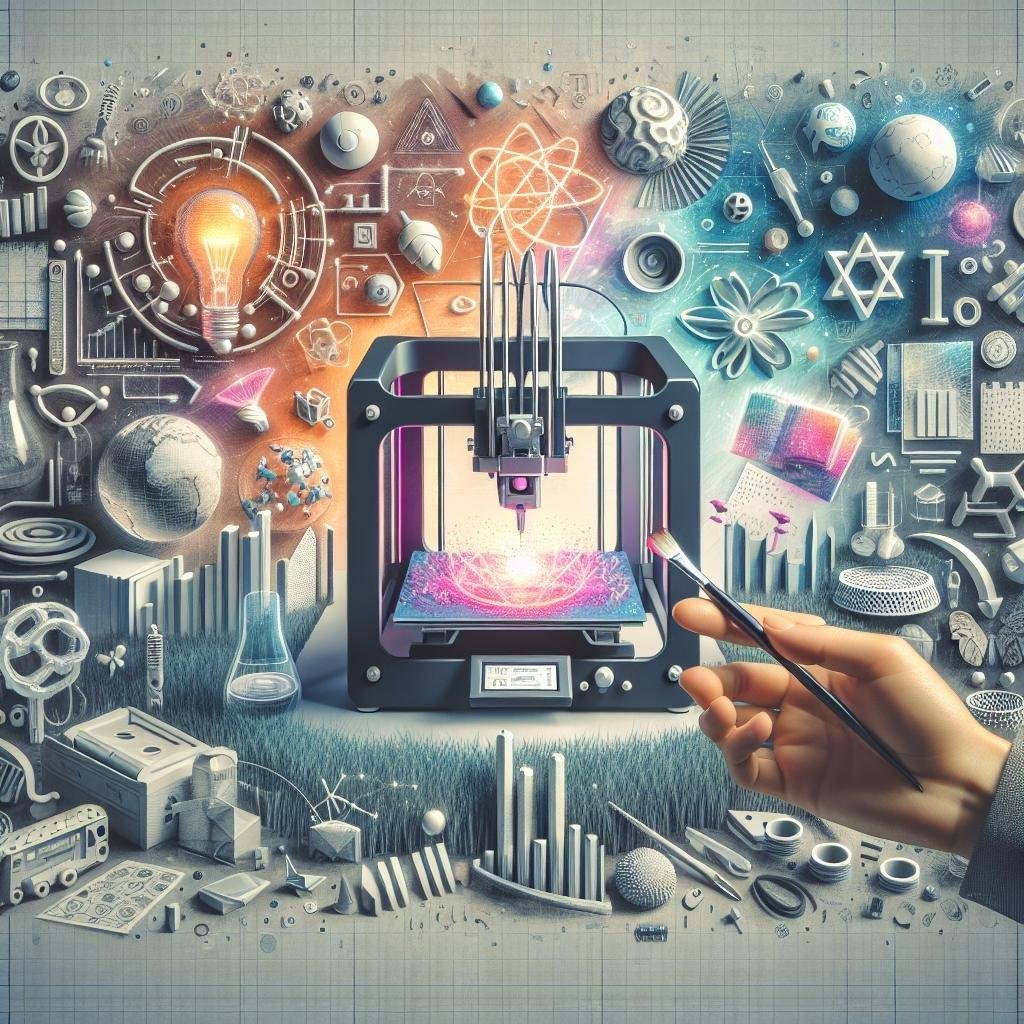In a world where imagination is the only limit, 3D printing has unlocked doors to realms once confined to the pages of science fiction. Welcome to the captivating universe of “Getting Creative with 3D Printing Projects,” where we explore innovative ways this transformative technology can bring your wildest ideas to life. Whether you’re a curious novice, an avid tech enthusiast, or an artist looking to add a new dimension to your work, this guide is your passport to a frontier where creativity knows no bounds. Let’s embark on this journey together, and watch ordinary objects morph into extraordinary masterpieces, one printed layer at a time!
Unlocking Imagination: Unique 3D Printing Ideas to Inspire Your Next Project
Imagine crafting one-of-a-kind home decor items, transforming your living space with personalized touches. With a 3D printer, the possibilities are as boundless as your creativity. Consider designing intricate wall art that doubles as a conversation starter or eye-catching vases that reflect your artistic flair. For more practical yet stylish additions to your home, create custom light switch covers, unique coasters, or even bespoke furniture knobs. The magic of 3D printing empowers you to craft pieces that are not only functional but also distinctly yours.
Beyond home decor, delve into the world of personalized gifts and accessories. Custom keychains featuring your friends’ initials or hobbies can serve as meaningful presents. Fashion enthusiasts can experiment by designing avant-garde jewelry pieces that push the boundaries of traditional aesthetics—think geometric earrings or intricate bracelets. For tech lovers, why not design a sleek and customized phone stand or a stylish smartwatch band? These projects not only make great gifts but also highlight the endless ways 3D printing can blend ingenuity with practicality.

Choosing the Right Materials: A Comprehensive Guide to 3D Printing Filaments
When embarking on your 3D printing adventures, selecting the right filament is as crucial as the design itself. The variety of filaments available can be overwhelming, but understanding their unique properties can make your creative journey more exciting. PLA (Polylactic Acid), for instance, is a popular choice due to its ease of use and biodegradability. Ideal for beginners, it offers a smooth printing process without the need for a heated bed. On the other hand, ABS (Acrylonitrile Butadiene Styrene) is known for its strength and durability, making it perfect for printing functional parts, but it often requires ventilation due to the fumes it emits during printing.
- PLA: Easy to use, smooth surface finish, biodegradable.
- ABS: Strong, durable, requires heated bed and ventilation.
- PETG (Polyethylene Terephthalate Glycol): Tough like ABS, easy to print like PLA, food-safe.
- TPU (Thermoplastic Polyurethane): Flexible, durable, excellent layer adhesion.
For those looking to get more experimental, PETG balances both the ease of printing with PLA’s smoothness and ABS’s strength, while also being food-safe, making it a great option for kitchen gadgets. If you’re aiming for flexible prints, TPU (Thermoplastic Polyurethane) is your go-to. It creates rubber-like textures, enabling you to print everything from phone cases to cosplay costumes. Each material opens up new realms of possibilities, and choosing the right one is part of the fun!
| Filament | Properties |
|---|---|
| PLA | Biodegradable, Easy to Use |
| ABS | Strong, Durable |
| PETG | Tough, Food Safe |
| TPU | Flexible, Durable |

Mastering the Craft: Essential Techniques for Flawless 3D Prints
For transforming your 3D printing adventures from hobbyist level to expert craftsmanship, it’s crucial to understand and implement a few core techniques. First, bed leveling is paramount. An uneven print bed can lead to disastrous results. Regularly check and adjust this using a calibration sheet, ensuring that the nozzle is equidistant across the entire surface. Next, focus on temperature control. Different materials such as PLA, ABS, or PETG require specific temperatures to avoid warping and ensure strong layer adhesion. Fine-tuning your printer’s nozzle and bed temperatures according to the filament manufacturer’s guidelines can make a tremendous difference.
- Layer Height Consistency: A lower layer height results in smoother prints but increases print time. Select a balance between detail and efficiency.
- Print Speed Adjustments: Slower speeds often result in higher quality, especially in intricate projects.
- Infill Patterns and Density: Explore different patterns like honeycomb or gyroid to optimize strength without excessive material use.
These foundational techniques can be further enhanced by experimenting with various slicer settings to suit your specific project needs.
Once you’ve nailed the basics, broaden your horizons by exploring advanced techniques. Multi-material printing allows you to combine different filaments in one project, adding both aesthetic and functional layers to your creations. Another key aspect is support structure optimization. Not all prints require the same kind of support; using custom supports, soluble filaments, or adjusting overhang angles can reduce print marks and cleanup time.
| Technique | Description |
|---|---|
| Bridging | Enhances printing over gaps without supports. |
| Retraction | Prevents stringing by retracting filament during travel moves. |
Venturing into post-processing can also elevate your printed objects. Techniques like sanding, painting, or chemical smoothing can add a professional finish that sets your work apart from the rest. Understanding and mastering these essential techniques not only saves materials and time but also enhances the overall quality and durability of your 3D printed projects.

Next-Level Customization: Tips for Personalizing Your 3D Creations
Elevating your 3D printing projects to a new level of personalization involves unleashing your inner artist. Begin by experimenting with color schemes using multi-filament prints or painting finished models. The texture of a creation can be transformed by varying print settings such as layer height and infill patterns. Adding individual touches like custom logos or symbols can make each piece uniquely yours. Don’t hesitate to play with the scale of your designs; resizing and combining different models can yield unexpected and delightful results.
- Material Choices: PLA, ABS, PETG, Flexible Filament
- Finishing Touches: Sanding, Priming, Painting, Varnishing
- Software: TinkerCAD, Blender, Fusion 360, Meshmixer
For a more technical flair, integrate functional elements like hinges or magnets into your designs. This can be particularly useful in creating modular parts that can be easily swapped or updated. You might also consider using heat-set inserts or threaded components to add durability and functionality. Collaborate with others by sharing your designs on platforms like Thingiverse or MyMiniFactory, and get feedback for continual improvement.
| Tool | Purpose |
|---|---|
| TinkerCAD | Beginner-friendly design software |
| Blender | Advanced modeling and sculpting |
| Fusion 360 | Professional-grade CAD software |
| Meshmixer | Editing and optimizing meshes |
Q&A
Q: What exactly is 3D printing, and why should I be excited about it?
A: 3D printing is like giving your imagination a physical form! Think of it as a super-charged, made-to-order wizard that can bring your wildest ideas to life—from fantastical creatures to functional objects. With this technology, you can create virtually anything layer by layer, right at home. Whether you’re a hobbyist, a professional, or a curious newbie, there’s always something new and exciting you can create.
Q: Okay, but what kinds of projects can I actually make with 3D printing?
A: The sky’s the limit! You can start with simple items like custom phone cases, jewelry, or home décor. Once you’re more comfortable, you can tackle more complex projects like fully articulated action figures, intricate musical instruments, or even functional mechanical parts. For those with a bigger imagination and a bit more experience, DIY drones or even cosplay costumes are just a print away!
Q: I’m not super tech-savvy. Is 3D printing something I can handle?
A: Absolutely, you can handle it! 3D printing technology has come a long way and there are plenty of user-friendly printers and software designed with beginners in mind. There’s also a supportive community of makers online where you can find tutorials, design inspiration, and troubleshooting tips. You’ll be amazed at how quickly you can go from zero to 3D hero.
Q: Do I need a lot of fancy equipment to get started?
A: Not at all. A basic 3D printer, some filament (that’s the material you print with), and an internet connection are all you need to get started. Many fantastic projects can be completed with just these simple tools. As you grow more confident and adventurous, you might decide to invest in upgrades or additional tools, but starting simple is totally doable.
Q: How can I get creative with my projects?
A: Creativity is your greatest ally in 3D printing. Start by thinking about the things you love or problems you’d love to solve. Customize everyday objects with personal designs, experiment with different materials, and collaborate with others to get fresh ideas. You can even mix 3D printed parts with other materials like fabric, wood, or metal to create hybrid masterpieces. The key is to let your imagination run wild and have fun with the process.
Q: Are there any tips for making my 3D printing projects more successful?
A: Absolutely! First, always start with a high-quality design—there are tons of free designs available online, or you can create your own using software like Tinkercad or Blender. Make sure your printer is calibrated correctly and that you’re using the right settings for your chosen material. Patience is important, too—sometimes your first print won’t go as planned, but each attempt will teach you something valuable. And lastly, don’t be afraid to experiment and tweak—you’ll find that happy accidents often lead to the coolest creations.
Q: How do I get involved in the 3D printing community?
A: The 3D printing community is wonderfully welcoming and full of passionate makers. Join online forums, attend local maker fairs, or participate in workshops. Websites like Thingiverse, Reddit, and specific Facebook groups are excellent places to start. Engaging with the community can provide inspiration, feedback, and sometimes even collaboration opportunities. It’s all about sharing and learning from each other.
Q: What’s the coolest 3D printing project you’ve seen so far?
A: That’s a tough one because there are so many cool projects out there! But, if we had to pick, one standout is the 3D-printed prosthetic limbs. These aren’t just life-changing; they’re also customizable with amazing designs and colors that fit the wearer’s personality. It’s a perfect blend of creativity, practicality, and making a real difference—truly the magic of 3D printing at its best!
So, ready to dive into the fab world of 3D printing? There’s no better time than now to start turning your dreams into tangible creations. Enjoy the process and happy printing!
Wrapping Up
As we wrap up our journey through the endlessly inventive world of 3D printing projects, remember that the essence of creativity lies in the courage to experiment and the freedom to push boundaries. Whether you’re designing whimsical toys, functional household items, or even avant-garde artworks, the only limit is your imagination. So, fire up your 3D printer, let your ideas flow, and watch as your digital dreams transform into tangible realities. Happy printing, fellow creators—your next masterpiece is just one layer away!

